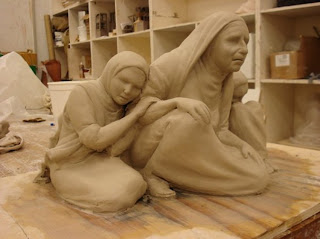
According to an article by Ulrike Putz, Bagdad,
the Iraqi art scene is 'slowly blossoming' once again. This is of no small significance as some say that the 'state of art is closely linked with the state of their nation'. Certainly the images in a variety of art forms captures the emotions, the heart of the Iraqi people.
The article by Ulrike Putz also points out that safety of Bagdad's artists whether they are sculptors, painters, playwrights or poets, are protected by the Iraqi army as they assemble over tea and a hookah to share stories and concerns. To learn more about the re-emergence of art in Iraq go to: http://www.spiegel.de/international/zeitgeist/0,1518,690433,00.html.
 |
| Qasim Sabti, artist and gallery owner and expert on visual arts in Iraq. |
 |
| An example of the work that is on display at Sabti's gallery. Work ranges from traditional like this one to abstract. |














